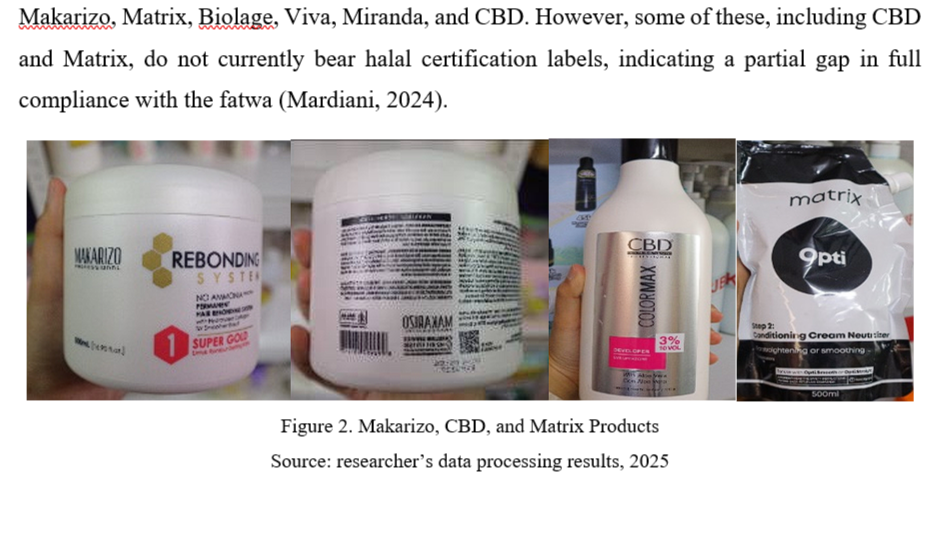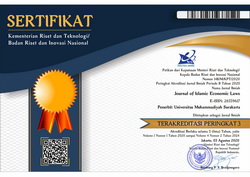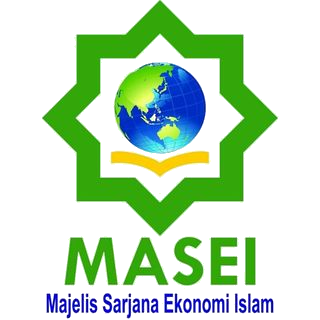Muslimah Label or Sharia-Compliant Brand? A Study on Kirei Salon and Spa Muslimah Bekasi Through The Lens of DSN-MUI Fatwa
DOI:
https://doi.org/10.23917/jisel.v8i02.9860Keywords:
Muslimah Salon, Sharia Compliance, Islamic Branding, Operational Practices, DSN-MUI FatwaAbstract
The growing popularity of Muslimah-branded beauty services raises questions about the authenticity of their compliance with Sharia principles. This study aims to critically examine whether Kirei Salon and Spa Muslimah Bekasi, which adopts an Islamic branding strategy, operates in accordance with Fatwa DSN-MUI No.108/DSN-MUI/X/2016 on Guidelines for Organizing Tourism Based on Sharia Principles, particularly in the context of spa, sauna, and massage services. This research method employing a descriptive qualitative approach, data were collected through interviews with the salon owner, staff, and customers, as well as field observations and documentation analysis. The findings indicate that while Kirei Salon and Spa Muslimah effectively maintains female-only service and promotes modesty in branding, several operational practices do not fully align with the DSN-MUI fatwa. Notable discrepancies include the use of uncertified beauty products, the offering of certain non-compliant treatments (e.g., hair colouring, extensions), and the absence of properly segregated prayer facilities. These findings suggest that the Muslimah label functions more as a branding identity rather than reflecting full adherence to Sharia-compliant operational standards. This study contributes to the discourse on Islamic branding by highlighting the gap between religious label usage and actual Sharia compliance in the beauty service sector. It provides a critical lens for both business practitioners and regulators to reevaluate the standards and authenticity of Muslimah-oriented branding.
Downloads
References
Agustina, A. H., Afriadi, R. D., Pratama, C., & Lestari, A. (2019). Platform Halal Lifestyle dengan Aplikasi Konsep One Stop Solution. Falah: Jurnal Ekonomi Syariah, 4(1), 56. https://doi.org/10.22219/jes.v4i1.8699
Al Mustaqim, D. (2023). Implementation of DSN-MUI Fatwa No. 108/DSN-MUI|X|2016 in The Development of Halal Tourist Destinations in The City of Cirebon: The Perspective of Maqashid Syariah. International Journal of Social and Management Studies, 4(3), 107–116. https://doi.org/doi.org/10.5555/ijosmas.v4i3.326
Ali al-Hashimi, M. (1996). The Ideal Muslimah the True Islamic Personality of The Muslim Woman (First). International Islamic Publishing House.
Andriani, N. (2021). Etika Komunikasi Bisnis dalam Perspektif Islam. Jurnal Al-Hikmah, 19(01), 13–26. https://doi.org/10.35719/alhikmah.v19i01.40
Arief, S., Ahmadi, S. N., Kamaluddin, I., & Wibisono, V. F. (2024). The Entrepreneurial Practice Behavior of Chinese Group Business in Indonesia: Contextualization from Islamic Business Ethics. Jurnal Ilmiah Ekonomi Islam, 10(2), 1938–1948. https://doi.org/10.29040/jiei.v10i2.12771
Arief, S., Wicaksono, M. B., Lahuri, S. bin, Wibisono, V. F., & Hasbullah, N. A. B. (2024). Suitability of The Implementation of Halal Tourism Principle at Sobo Kali Magelang Tourism: A Review of Fatwa DSN-MUI No.108/DSN-MUI/X/2016. Al-Kharaj: Journal of Islamic Economics and Business, 6(1), 1–16. https://doi.org/doi.org/10.24256/kharaj.v6i1.4913
Astuti, M. (2020). Pengembangan Produk Halal Dalam Memenuhi Gaya Hidup Halal (Halal Lifestyle). Iuris Studia: Jurnal Kajian Hukum, 1(1), 14–20. https://doi.org/10.55357/is.v1i1.16
Awwaliyah, R., Rahman, O. F., Adrina, R., & Putri, F. A. (2023). Implementation of Maqashid Shariah Principles in the Beauty Salon Business. Business and Sustainability, 2(1), 1–10. https://doi.org/10.58968/bs.v2i1.332
Bella Aprilia Devi Sampurno, A. (2017). Pengaruh Implementasi Prinsip Etika Bisnis Islam Terhadap Preferensi Konsumen Salon Dan Spa Muslimah (Studi Di Salon Dan Spa Muslimah Yasna Malang) [Universitas Brawijaya]. https://repository.ub.ac.id/id/eprint/109621/
Devi, A. (2025). The Concept of Holistic Hygiene in Islam: The Integration. Edukasi Islami: Jurnal Pendidikan Islam, 14(01), 229–246. https://doi.org/10.30868/ei.v14i01.8104
Dewi, N. N. K., & Warmika, I. G. K. (2017). Pengaruh Internet Marketing, Brand Awareness, Dan Wom Communication Terhadap Keputusan Pembelian Produk Spa Bali Alus. E-Jurnal Manajemen, 6(10), 5580–5606. https://ojs.unud.ac.id/index.php/manajemen/article/view/32403/20967
Dewi, S. A. (2024). Interview Result (p. 13 September). as Employee of Kirei Salon and Spa Muslimah.
Fatwa DSN-MUI No. 18/DSN-MUI/X/2016 tentang Pedoman Penyelenggaraan Pariwisata Berdasarkan Prinsip Syariah, (2016).
Exactitude Consultancy. (n.d.). Pasar Spa dan Salon Kecantikan. https://exactitudeconsultancy.com/id/reports/35481/spas-and-beauty-salons-market#request-a-sample
Faidah, M., Rusmanto, H., Rahmawati, L., Kusstianti, N., & Wijayanti, F. P. (2021). Exploring muslim tourist needs at Halal Spa facilities to support Indonesia’s Sharia Tourism. International Journal of Religious Tourism and Pilgrimage, 9(1), 118–131. https://doi.org/doi.org/10.21427/qme4-g097
Hida, F. T., Basalamah, R., & Nurhidayati, N. (2021). Analisis Manajemen Industri Halal Perspektif Ekonomi Islam. Jurnal Reflektika, 16(1), 49. https://doi.org/10.28944/reflektika.v16i1.541
Husna, A., & Suryana, B. (2017). Metodologi Penelitian dan Statistik (Pertama). Pusat Pendidikan Sumber Daya Manusia Kesehatan.
Jaelani, A. (2017). Halal Tourism Industry in Indonesia: Potential and Prospects. International Review of Management and Marketing, 7(3), 1–19. https://doi.org/10.2139/ssrn.2899864
Lailyah, N., Yasin, R. M., Karatri, R. H., & Lusianti, D. (2021). Faktor Yang Memengaruhi Kepuasan Konsumen Jasa Salon Muslimah Di Masa Pandemi Covid-19. Kajian Bisnis Sekolah Tinggi Ilmu Ekonomi Widya Wiwaha, 30(1), 66–77. https://doi.org/10.32477/jkb.v30i1.323
Lauri, M. A. (2011). Triangulation of Data Analaysis Technique. Papers on Social Representations, 20(2), 34.1-34.15. http://www.psych.lse.ac.uk/psr/
Mardiani, D. (2024). Interview Result.
Mundir, A. (2020). Etika Bisnis Islam Pada Era Distrupsi. Jurnal Mu’allim, 2(1), 15–28. https://doi.org/10.35891/muallim.v2i1.2157
Najib, M. F., Kusdiana, W., & Razli, I. A. (2022). Local Halal Cosmetic Products Purchase Intention: Knowledge, Religiosity, Attitude, and Islamic Advertising Factors. Journal of Islamic Economic Laws, 5(2), 177–198. https://doi.org/10.23917/jisel.v5i2.19199
Nihayatunnisa, M., Febriani, E., Hasanah, U., & Kumaidi, M. (2024). Awareness of Female Students In Covering Their Intimate Parts Properly. International Journal of Education, Information Technology and Others (IJEIT), 7(August), 264–272. https://doi.org/doi.org/10.5281/zenodo.13751087
Nikmatullah, N. (2023). Awrah and Women’s Clothing: Reinterpretation of Islamic Texts in Indonesian Contexts. At-Turas: Jurnal Studi Keislaman, 10(2), 282–298. https://doi.org/10.33650/at-turas.v10i2.6785
Pramana, M. S. A., & Khair, M. S. (2024). Israf’s Prohibition in QS. al-A’raf : 31 (Abdullah Saeed’s Contextual Approach). Al-Fahmu: Jurnal Ilmu Al-Qur’an Dan Tafsir, 3(1), 108–124. https://doi.org/10.58363/alfahmu.v3i1.191
Prameswari, M. S., & Maspiyah, M. (2018). Faktor-faktor yang Mempengaruhi Minat Konsumen pada Body Spa dengan Kosmetika Berbahan Green Tea di Alesya Salon dan Spa Muslimah Surabaya. Jurnal Tata Rias, 7(3), 102–111. https://doi.org/doi.org/10.26740/jtr.v7n3.p%25p
Rahmawati, T., Rojak, E. A., & Wijayanti, I. M. (2023). Implementasi Fatwa Dsn-Mui Nomor: 108/Dsn-Mui/X/2016 Tentang Pedoman Penyelenggaraan Pariwisata Berdasarkan Prinsip Syariah Terhadap Penyelenggaraan Spa, Sauna, Dan Massage Di Kota Bandung (Studi Pada Bunda Umar Muslimah Daily Salon & Spa). Bandung Conference Series: Sharia Economic Law, 3(2), 534–540. https://doi.org/10.29313/bcssel.v3i2.8402
Sahara, A. L., Edy, Y., & Gunanto, A. (2021). Analisis Keputusan Pencantuman Labelisasi Halal pada Salon Muslimah. Iqtisaduna, 7(1), 62–71. https://doi.org/10.24252/iqtisaduna.v7i1.2.1.586.61.
Sahih Muslim. (n.d.). Prohibition Adding Hair Extensions, Having Them Added, Tattooing, Being Tattooed, An-Namisah, Al-Mutanamisah, Separating Teeth, and Changing The Creation of Allah. In The Book of Clothes and Adornment (p. 185). sunnah.com. https://sunnah.com/muslim:2126
Siyoto, S., & Sodik, A. (2015). Dasar Metodologi Penelitian (Pertama). Literasi Media Publishing.
Sobari, N., Kurniati, A., & Usman, H. (2022). The influence of Islamic attributes and religious commitments toward halal wellness services customer satisfaction and loyalty. Journal of Islamic Marketing, 13(1), 177–197. https://doi.org/doi.org/10.1108/JIMA-11-2018-0221
Sufyati, S., Kusumadewi. Yessy, Rimawan, M., Syaiful, M., Kurniawan, D., Barlian, B., Cahyono, B., Wahyani, W., Prasetyandari, C. W., Seto, A. A., Ashriana, N. A., Wahyuningsih, P., Julyanthry, J., & Sarjana, S. (2022). Pengantar Bisnis (M. T. Rambe & E. P. Sari (eds.); Pertama). PT Global Eksekutif Teknologi.
Sumita, S., & Maksum, M. (2024). Are Islamic Branding and Halal Awareness Relevant ? A Study of Annuqayah Santri s Purchasing Decisions on Wardah Cosmetics. Airlangga Journal of Innovation Management, 5(4), 599–615. https://doi.org/doi.org/10.20473/ajim.v5i4.63453
Triswardani, N., Hidayat, A. R., & Hayatudin, A. (2020). Analisis Implementasi Fatwa DSN-MUI No : 108/X/2016 tentang Pedoman Penyelenggaraan Pariwisata Berdasarkan Prinsip Syariah pada Penyelenggaraan Salon dan Spa di Haura 2 Cipanas. Prosiding Hukum Ekonomi Syariah, 6(2), 477–481. https://doi.org/dx.doi.org/10.29313/syariah.v6i2.22243
Wati, M., & Saputra, H. (2018). The Concept of Tabarruj in the Qur’an according to Muslim Commentators. AJIS: Academic Journal of Islamic Studies, 3(2), 163. https://doi.org/10.29240/ajis.v3i2.577
Wijayanti, N. (2024). Interview Result (p. 15 September). as Visitors of Kirei Salon and Spa Muslimah.
Yaassin, M., & Rahma, R. S. (2023). Tinjauan Hukum Ekonomi Islam Terhadap Praktik Tanam Bulu Mata Palsu (Eyelash Extention) Studi Kasus di Salon Rianty Lina Kecamatan Sape Kabupaten Bima. Iqtishaduna: Jurnal Ilmiah Mahasiswa Jurusan Hukum Ekonomi Syari’ah, 4(4).
Yani. (2024). Interview Result (p. 13 September). as Employee of Kirei Salon and Spa Muslimah.

Downloads
Submitted
Accepted
Published
How to Cite
Issue
Section
License
Copyright (c) 2025 Journal of Islamic Economic Laws

This work is licensed under a Creative Commons Attribution-ShareAlike 4.0 International License.



















